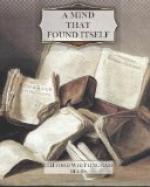Though I might present myself at your door, armed with one of society’s unfair skeleton-keys—a letter of introduction—I prefer to approach you as I now do: simply as a young man who honestly feels entitled to at least five minutes of your time, and as many minutes more as you care to grant because of your interest in the subject to be discussed.
I look to you at this time
for your opinion as to the value of
some ideas of mine, and the
feasibility of certain schemes based
on them.
A few months ago I talked with President Hadley of Yale, and briefly outlined my plans. He admitted that many of them seemed feasible and would, if carried out, add much to the sum-total of human happiness. His only criticism was that they were “too comprehensive.”
Not until I have staggered an imagination of the highest type will I admit that I am trying to do too much. Should you refuse to see me, believe me when I tell you that you will still be, as you are at this moment, the unconscious possessor of my sincere respect.
Business engagements necessitate
my leaving here early on Monday
next. Should you care
to communicate with me, word sent in care of
this hotel will reach me promptly.
Yours very truly,
CLIFFORD W. BEERS.
Within an hour I had received a reply, in which Mr. Choate said that he would see me at his home at ten o’clock the next morning.
At the appointed time, the door, whose lock I had picked with a pen, opened before me and I was ushered into the presence of Mr. Choate. He was graciousness itself—but pointed significantly at a heap of unanswered letters lying before him. I took the hint and within ten minutes briefly outlined my plans. After pronouncing my project a “commendable one,” Mr. Choate offered the suggestion that produced results. “If you will submit your ideas in writing,” he said, “I shall be glad to read your manuscript and assist you in any way I can. To consider fully your scheme would require several hours, and busy men cannot very well give you so much time. What they can do is to read your manuscript during their leisure moments.”
Thus it was that Mr. Choate, by granting the interview, contributed to an earlier realization of my purposes. One week later I began the composition of this book. My action was unpremeditated, as my quitting Boston for less attractive Worcester proves. That very day, finding myself with a day and a half of leisure before me, I decided to tempt the Muse and compel myself to prove that my pen was, in truth, “the tongue of a ready writer.” A stranger in the city, I went to a school of stenography and there secured the services of a young man who, though inexperienced in his art, was more skilled in catching thoughts as they took wing than I was at that time in the art of setting them free. Except in the writing of




